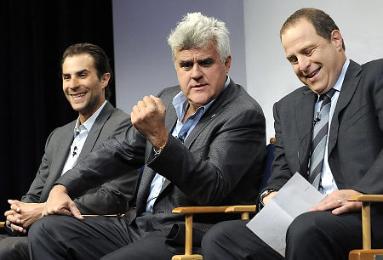NBC: "Must Flee TV" Redux - The Shelly Palmer Report

Here's what you already know:
1) NBC's going to put Jay Leno on five nights a week in the fall.
2) This will save them a great deal of money.
3) Jeff Zucker, Ben Silverman, and to a lesser extent, Marc Graboff are being mercilessly chastised in the blogosphere.
4) Les Moonves is delighted by the fact that there will be one less competitor in the marketplace at 10p.
First, let's get one thing clear: Things change. If you look around you, you will not find a business anywhere in the United States that operates the same way today as it did in the pre-Internet, pre-Google world.
With regard to our industry, I have written a book, Television Disrupted: The Transition from Network to Networked TV (2008, York House Press)which dramatically illustrates how, um … television has been disrupted by the advent of technology, the fractionalization of audiences and the margin-leveling pressure of consumer control.
With that said, let's take a minute to explore the impact of the paradigm shifts that NBC's decision might initiate.
Scenario 1 – Leno Is A Ratings Success
I consider Ben Silverman a good friend, I like Jeff Zucker and I'm a habitual NBC viewer, so this is my favorite scenario. Here life is good. Big ratings mean big advertising dollars. Unfortunately, dramatic hours will move from the "endangered species" list to the "critically endangered species" list. TV, after all, is a business of follow the leader. Under the "Leno is a ratings success" scenario, NBC would see a cash windfall for as long as they could sustain the show. This is undoubtedly how the network brass envision the future.
There are several downsides here, but they affect the business, not NBC particularly. For example: removing five hours of new dramatic programming from existence will seriously reduce the size of the off-net syndication business. Less dramas to syndicate or sell to cable means a smaller business in new television production overall. Just think about how the television landscape changed after ABC decided to milk "Millionaire" for all it was worth. Sure, it was a cash cow for ABC, but ultimately it trained cable nets to create good looking, cost-effective original programming much earlier than they would have if left to their own devices. There was no product to buy. This issue will happen no matter which "Leno at 10" scenario ultimately unfolds.
Scenario 2 – Leno Does OK, but the show follows its current ¼ trends
Here NBC will still make some money. Doing OK with low production costs is an acceptable result. However, local television stations (network affiliates) rely on the strength of the 10p hour to lead into their late local news. Even if you attempt to program the best stuff last, traditionally Jay's audience diminishes over the course of each episode. This will be horrible for affiliate relations, to say nothing of the fact that news is "the" profit center for every local station that does news programming. Here dramatic hours move from "endangered species" list up a few notches to "near threatened." NBC's competition will start using the better-rated dramatic hours to strengthen their local affiliates and NBC will ultimately suffer for it. To add insult to injury, Jay's 10pm show is not TiVo-proof. If viewers wait until 10:20 to start watching, they will miss the 10p local news break (the highest-priced local avail) and bump headlong into the opening minutes of the late local news, the next most profitable avails for local stations.
Scenario 3 – Leno Does Marginally Well, but the best bits find their way online.
In this case, NBC will start to die a thousand deaths. Imagine a linear audience of 54-dead and a snack-sized online audience that cannot be monetized. Ouch!
Scenario 4 – Leno Fails
This scenario comes in two flavors: quick failure and protracted failure. In the best case, the show fails as fast as Rosie failed and the world moves on. In the worst case, the show gets a quick ratings boost (from the novelty) and then starts a slow descent into the abyss. This may happen for a number of reasons. The first being the "booker factor." NBC will have three talk shows running back to back all looking for the same guests each night. How long can this model sustain. There aren't that many interesting things going on in the world. Can we really expect to see Brad Pitt promoting a new movie on all three shows? Doubtful. He'd choose the Primetime show because, in theory, it will have better ratings than the Tonight Show or Late Night.How will Conan feel about this? Someone might want to ask him.
No matter what happens, I'm pretty sure the network television business will be changed forever. You could argue, as one of my good friends from NBC did today in a private email to me, that: "The network business – as a single revenue stream business – was in trouble as soon as 100 cable channels could produce original programming (scripted or unscripted) at a lower price point than networks – as dictated by the guilds; with far less government regulation. In a few years the government will have to bail out local TV."
At the end of the day, broadcast network television is a scarce resource. The signal passes 99% of the households in the United States. If you need to reach the largest number of people, for the least amount of money per person, broadcast network television is your best bet. For as long as this is true, the business will sustain. However, as Jeff Zucker pointed out in his speech at the UBS conference the other day, "Can we continue to broadcast 22 hours in primetime? Three of our competitors don't. Can we continue to broadcast seven days a week? One of our competitors doesn't."
If you have read "On the Origin of Species by Means of Natural Selection, or the Preservation of Favoured Races in the Struggle for Life" by Charles Darwin (1859) you know where this is headed. I prefer Richard Dawkins's perspective on the thesis; he calls it, "survival of the most adaptable." When the dust settles, there will not be room for four major broadcast networks all producing high-end shows, all week long. It's not that way now. What will happen is obvious. The strongest competitors with most measurable audiences that deliver the biggest ROAS for their clients will get bigger and the weaker competitors, no matter what they can measure, will get smaller.
Jeff went on to say that the broadcast TV model has to be rethought in the face of fierce competition from cable and the Internet. I couldn't agree more. And I believe that his admonition, "If you don't, then the broadcast network will end up like the newspaper companies, or worse, like the auto companies," is prescient.
Transitions are tough. And, as we all know, people don't really like change. But I think this is the first step in the evolution of our business and, although I am one of those who would not hesitate to take a cheap shot at Ben or Jeff for a rating point, I have to give them both credit for trying to fight the good fight.
The media business is fast becoming broadband-centric and on-demand. If you can't find additional money to invest, and you have to do something, trying to increase shareholder value isn't a bad place to start.
Shelly Palmer is a consultant and the host of MediaBytes a daily show featuring news you can use about technology, media & entertainment. He is Managing Director of Advanced Media Ventures Group LLC and the author of Television Disrupted: The Transition from Network to Networked TV (2008, York House Press). Shelly is also President of the National Academy of Television Arts & Sciences, NY (the organization that bestows the coveted Emmy® Awards). You can join the MediaBytes mailing list here. Shelly can be reached at shelly@palmer.net
Check out the Shelly Palmer Report archive.


